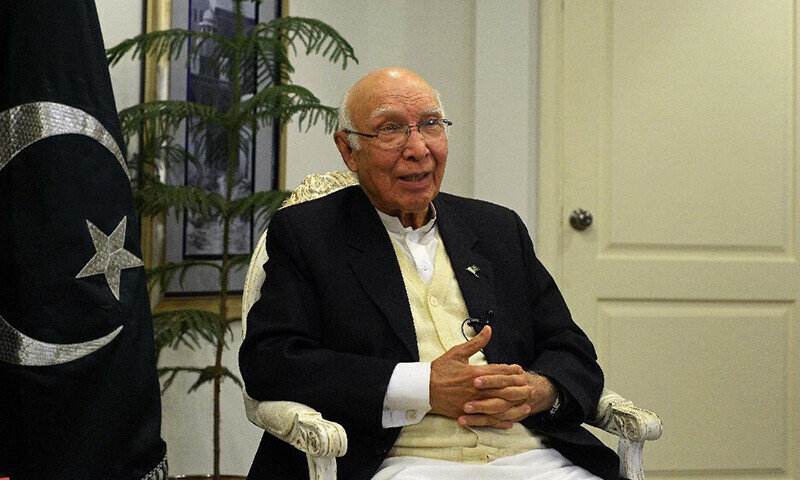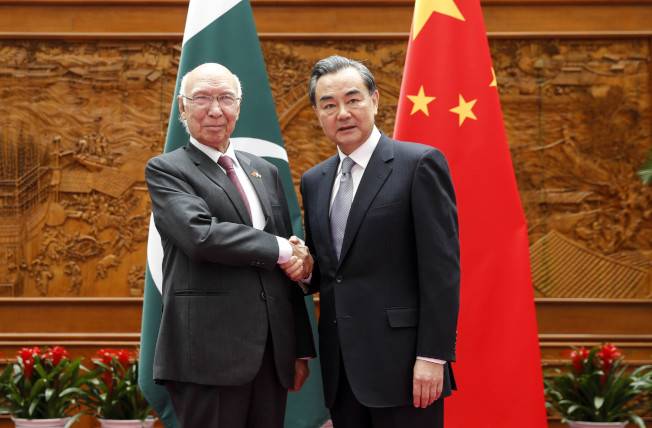The PML-N family is deeply saddened by the departure of a staunch member and towering figure of Pakistan Muslim League-Nawaz (PML-N). Sartaj Aziz was a prominent figure in the country’s political and administrative landscape. His life, spanning over nine decades, was marked by his unwavering commitment to public service, his academic pursuits, and his tireless efforts towards promoting peace and economic development.
As soon as the news of his passing broke, condolences poured in from within and outside Pakistan. Chinese Foreign Ministry spokesperson Wang Wenbin expressed deep condolences over the passing of former foreign minister Sartaj Aziz, hailing his outstanding contribution to China-Pakistan relations. “Mr Aziz was a seasoned politician, strategist, and economic expert of Pakistan, and an old and good friend of the Chinese people,” Wang said.
Sartaj Aziz was born on 7 February 1929 in a Kakakhel family in the North Western Frontier Province of British India. As a student, he participated in the Pakistan Movement. He earned a degree in commerce at Punjab University and joined civil service in 1952. He later went on to study at Harvard University, where he obtained a master’s degree in Public Administration (Economic Development) in 1963.
 After serving in various positions, he rose to the level of a joint secretary in the Planning Commission and was one of the main contributors to the Third and Fourth Five-Year Plans of Pakistan. He retired from government service and started a distinguished international career in 1971 when he joined the Food and Agriculture Organisation as director of the Commodities and Trade Division in Rome.
After serving in various positions, he rose to the level of a joint secretary in the Planning Commission and was one of the main contributors to the Third and Fourth Five-Year Plans of Pakistan. He retired from government service and started a distinguished international career in 1971 when he joined the Food and Agriculture Organisation as director of the Commodities and Trade Division in Rome.
According to Pakistan’s Foreign Office website, “In 1974, he served as Deputy Secretary General of the World Food Conference, held in Rome in November 1974 and was one of the architects of the global food security system which emerged from the Conference and of the proposal to establish the International Fund for Agricultural Development (IFAD). In 1977, after serving as Deputy Executive Director of the World Food Council for two years he was Assistant President, Policy and Planning at IFAD from December 1977 to April 1984.”
Sartaj Aziz returned to Pakistan in 1984 and served as a junior minister for Agriculture and Food Security until 1988. He was elected to the Senate of Pakistan in 1988 and re-elected in 1993 from the PML-N. He served as finance minister from August 1990 to June 1993 and again from February 1997 to August 1998. In 1998, he was made minister of foreign affairs, a position he retained until the 1999 military coup.
His commitment to economic progress aligned with his pro-peace stance, reflecting a holistic approach to national development.
During his terms in office, Aziz made an effort with neighbouring India to promote peace and harmony between the two countries. He is noted as the only cabinet member who opposed the decision to conduct nuclear tests in response to India, citing economic reasons. As the Finance Minister, Aziz emerged as a staunch advocate of economic liberalisation. His commitment to economic progress aligned with his pro-peace stance, reflecting a holistic approach to national development.
In 2004, Aziz transitioned to academia, becoming the vice-chancellor of Beaconhouse National University, which transformed into a leading liberal arts university under his leadership.
Mian Nawaz Sharif held such trust in Sartaj Aziz’s financial and diplomatic acumen that when he assumed the office of prime minister in 2013, he extended an invitation for Aziz to join his cabinet in the dual capacity of advisor on foreign affairs and national security, which he accepted.

Sartaj Aziz authored two books and several articles. His significant contribution to development literature came in the form of his book on China titled Rural Development: Learning from China’, published by Macmillan in London in 1978. His memoir, Between Dreams and Realities was published by Oxford University Press in 2009. Additionally, a compilation of his essays titled Hunger, Poverty and Development — Life and Work of Sartaj Aziz was published by Ferozsons in 2000.
According to the web archive of the Senate of Pakistan, “Mr Sartaj Aziz is holder of the Sanad, Mujahid-e-Pakistan by virtue of his participation in the Pakistan Movement. He was awarded Tamgha-e-Pakistan and Sitara-e-Khidmat in 1959 and 1967 respectively for his contribution to planning and development in the country.”
Pervaiz Rashid posted on the social media platform X, and a rough translation of his post is, “Among the indelible impressions that Sartaj Aziz left of his intelligence, ability, and service, is our electoral symbol ‘tiger’. In its first electoral contest as a party, the favourite symbol of PML-N candidates was allotted to the rival League faction, so Sartaj Sahib secured the invincible symbol of the tiger.”
Mr Sartaj Aziz died peacefully on 2 January in Islamabad at the age of 94, leaving behind a legacy of public service, diplomatic achievements, and academic contributions. The tributes pouring in reflect the deep admiration for a man whose efforts for the nation will be eternally remembered. May Allah bless his soul and grant patience to his family as the nation mourns the loss of a distinguished leader and advocate for peace.
The writer holds an MA in Political Science from the Government College University and an LLB from the University of the Punjab.








